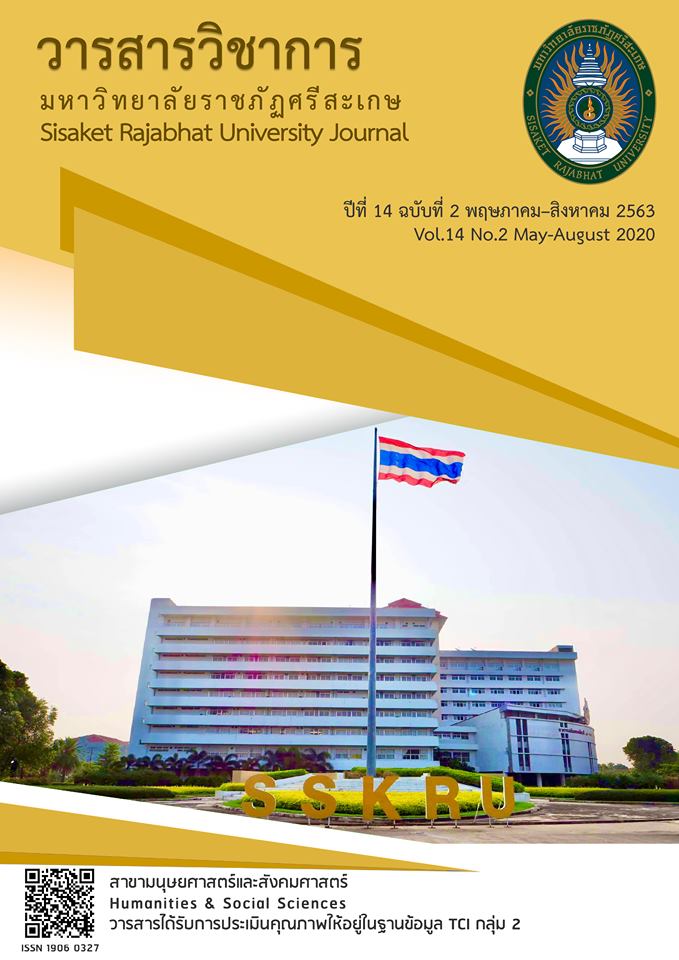การวางแผนภาษีของบริษัทนอกตลาดทุนที่มีผลต่อการจัดการกำไร ในประเทศไทย
Main Article Content
บทคัดย่อ
วัตถุประสงค์ของวิจัยเพื่อศึกษาการวางแผนภาษีของบริษัทนอกตลาดทุนที่มีผลต่อการจัดการกำไรในประเทศไทย กลุ่มตัวอย่างที่ใช้ในการวิจัย คือ บริษัทมหาชนจำกัดจากการจัดอันดับ 100 โดยกรมพัฒนาธุรกิจการค้า แบ่งตามรายได้, สินทรัพย์, กำไร, และตามทุนจดทะเบียน โดยรวบรวมข้อมูลจากงบการเงินของบริษัทตั้งแต่ปี พ.ศ. 2559 จนถึง พ.ศ. 2561 จำนวน 414 ตัวอย่าง และใช้การวิเคราะห์ข้อมูลถดถอยเชิงพหุคูณ (Multiple Linear Regression) โดยการวางแผนภาษีวัดจากอัตราภาษีที่แท้จริงและอัตราส่วนภาษีต่อสินทรัพย์รวม และการจัดการกำไรจะใช้แบบจำลอง Modified Jones (1991) ผลการศึกษาพบว่าการวางแผนภาษี (วัดค่าโดย TAX/ASSET ) มีผลกระทบเชิงบวกการจัดการกำไร เนื่องจากประเทศไทยความสัมพันธ์ระหว่างหลักการทางบัญชีและหลักทางภาษีมีความสัมพันธ์กัน อาจทำให้ผู้บริหารมีแรงจูงใจในการจัดการกำไร นอกจากนั้นบริษัทจดทะเบียนในตลาดหลักทรัพย์แห่งประเทศไทยมีการวางแผนภาษีและการบริหารกำไรแตกต่างจากบริษัทนอกตลาดทุน โดยผลการวิจัยคาดว่าจะช่วยให้ข้อมูลเพิ่มเติมในการตัดสินใจลงทุนเพื่อให้นักลงทุนมองข้อมูลทางการบัญชี ในมุมมองการวางแผนภาษีมากขึ้น
Article Details
1. เนื้อหาและข้อมูลในบทความที่ลงตีพิมพ์ในวารสารวิชาการมหาวิทยาลัยราชภัฏศรีสะเกษ ถือเป็นข้อคิดเห็นและความรับผิดชอบของผู้เขียนบทความโดยตรง ซึ่งกองบรรณาธิการวารสาร ไม่จำเป็นต้องเห็นด้วย หรือร่วมรับผิดชอบใด ๆ
2. บทความ ข้อมูล เนื้อหา รูปภาพ ฯลฯ ที่ได้รับการตีพิมพ์ในวารสารวิชาการมหาวิทยาลัยราชภัฏศรีสะเกษ กองบรรณาธิการไม่สงวนสิทธิ์ในการคัดลอกบทความเพื่อการศึกษา แต่ให้อ้างอิงแหล่งที่มาให้ครบถ้วนสมบูรณ์
เอกสารอ้างอิง
and Tax Considerations: A Conceptual Analysis. International Journal of
Business Management and Commerce., 3(2), 25-35. [In Thai]
Baideen, O. (2015). The Relationship Ownership Shareholder Board Composition
and Corporate Social Responsibility Disclosures : A Case Study of Listed
Companies in The Stock Exchange of Thailand (SET).
Songkla University, Songkla University. [In Thai]
Chen, K. Y., Elder, R. J., & Hung, S. (2010). The investment opportunity set and earnings
management: Evidence from the role of controlling shareholders.
Corporate Governance: An International Review, 18(3), 193-211.
Gaertner, F. B. (2014). CEO after-tax compensation incentives and corporate tax
avoidance. Contemporary Accounting Research, 31(4), 1077-1102.
Hair, J. F., Black, W. C., Babin, B. J. & Anderson, R. E. (2010). Multivariate data analysis.
Pearson Education, New Jersey.
Hassan, S.U., & Bello, A. (2013). Firm Characteristics and financial reporting quality of
listed manufacturing firms in Nigeria. International Journal of Accounting,
Banking and Management, 1(6), 47-63.
Ifada, L. M. & Wulandari, N. (2015). The Effect Of Deferred Tax And Tax Planning Toward
Earnings Management Practice (Empirical Study on Non Manufacturing
Companies Listed in Indonesia Stock Exchange in the period of 2008-2012).
International Journal of Organizational Innovation, 8(1).
Jones, J. J. (1991). Earnings management during import relief investigations. Journal of
accounting research, 29(2), 193-228.
Lanis, R., & Richardson, G. (2011). The effect of board of director composition on
corporate tax aggressiveness. Journal of Accounting and Public Policy,
30(1), 50-70.
Marques, M., Rodrigues, L. L. & Craig, R. (2011). Earnings management induced by tax
planning: The case of Portuguese private firms. Journal of International
Accounting, Auditing and Taxation, 20(2), 83-96.
Mulyadi, M. S., & Anwar, Y. (2015). Corporate governance, earnings management and tax
management. Procedia-Social and Behavioral Sciences, 177, 363-366.
Naz, I., Bhatti, K., Ghafoor, A., & Husein, H. (2011). Impact of firm size and capital
structure on earnings management: Evidence from Pakistan. International
Journal of Contemporary Business Studies, 2(12), 22-31.
Prommala, W. (2016). Relationship Between Earnings Management and Executive
Compensation of Listed Companies in the Stock Exchange of Thailand.
Chiang Mai University, Chiang Mai. [In Thai]
Tantiyavarong, T. (2009). A Study of the Determinants of Tax Planning and the
Association between Tax Planning and Firm Value: An Empirical Evidence
of Thailand. Chulalongkorn University, Bangkok. [In Thai]
Wang, S. & Chen, S. (2012). The motivation for tax avoidance in earnings management.
Scientific Research, 447-450.
Warsono. (2017). Deferred Tax Assets and Deferred Tax Expense Against Tax Planning
Profit Management. Shirkah Journal of Economics and Business,
2(2), 199-214.
Watts, R. L., & Zimmerman, J. L. (1990). Positive accounting theory: a ten year
perspective. Accounting review, 131-156.
Young, M. R. (2002). Accounting Irregularities & Financial Fraud. Aspen law & business.


